Erin McKechnie
This user hasn't shared any biographical information
Posts by Erin McKechnie
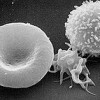
Blood
Apr 9th
Within the human body we have 60,000 miles of blood vessels. We have three types of cells in the blood, red, white, and platelets. Red blood cells transport oxygen throughout the body while white blood cells help protect us against infection. Platelets are involved in clotting. When you get a cut your vessels send out signals calling for for platelets and proteins to help in clotting. In addition, white blood cells also come to the rescue. A blood clot is a group of chemicals and cells that work together to stop the flow of blood in a small area. All More >
Bacteria and Antibiotics
Nov 11th
There are a number of various types of bacteria that naturally exist in our bodies and help us in different ways. Unfortunately, bacteria get a bad reputation. Most people are unaware of how important these organisms are. It is estimated that in a healthy person, there are about ten times as many bacteria cells as human cells! Fluctuations in the level of these bacterial cells can lead to problems such as digestive issues, skin problems, obesity, and more. It is important to think about the way bacteria cells function and evolve when we consider our own health.
If an individual becomes More >
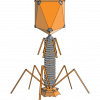
Viruses
Oct 11th
What do you think of when someone says virus? Most people would say infection, getting sick, germs, and other negative associations. Not only are viruses a valuable tool in research, they offer a look into history and also our own bodies. I’ve recently become a bit obsessed with learning more about them. Part of it is that I thought I knew more than I did. There is a huge amout of information just waiting to be uncovered. Too often we think we know something and it prevents us from learnng more. Even something simple like having the chicken pox…
I remember More >
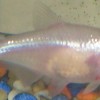
Rhythm of the Night
Sep 8th
Circadian rhythms, or cycles of activity during a 24 hour period, are highly conserved across species. While we have much to learn about these daily patterns of life, scientists have found an organism that may offer new insight.
The timing of this internal clock is related to the amount of exposure to light. How do circadian rhythms work in organisms that are not exposed to light? A Somalian cavefish, Phreatichthys andruzzii, is a blind species that has been living without light for approximately 1.4 to 2.6 million years!
Researchers compared the cave fish to zebrafish during exposures to 12 hour period of More >
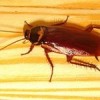
Cockroach Brains as Medicine
Sep 22nd
Each day your body works to defend you against invaders. Harmful bacteria, viruses, and fungi can enter your system and cause diseases. In addition to relying on your immune system, it is helpful to avoid contact with germs by thoroughly washing your hands and keeping your environment clean.
How is it possible that some organisms have the ability to survive in some of the dirtiest places on earth? What survival mechanisms do they have that differ from ours?
Scientists ground up the brains and other nerve tissues from two species of insects, the American cockroach and the desert locust. Material extracted from More >

Recycled DNA
Aug 25th
The majority of our DNA does not code for protein or RNA and does not seem to regulate how the information is used. Sometimes referred to as “junk” DNA, these regions make up about 98.5 % of our genome. Is this DNA really junk?
Scientists have recently identified a section of “junk” DNA that can regain function and cause disease. The section of DNA is made of repeat regions of the same sequence. They found that individuals who have 1-10 repeats on the end of chromosome 4 can develop one of the most common forms of muscular dystrophy, FSHD. The goal now is More >
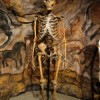
Neandertal DNA and Proteins
May 19th
With the completion of the Neandertal genome by the team of Dr. Svante Paabo and a closer look at their proteins by Gregory Hannon’s team at CSHL, scientists reveal incredible similarities between Neandertals and humans.
Neandertals, the extinct species of what are most likely our closest relatives, lived on earth at the same time as our human ancestors but died out about 30,000 years ago. With the sequence of their genome now complete, we can compare the DNA to humans and chimpanzees to learn more about what makes humans unique as a species.
The discovery of fossils is an exciting link to More >
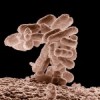
Amazing Microbes
Mar 16th
Most people associate microorganisms, such as bacteria fungi and protists, with little more than making people sick. While some can create serious problems for us, these amazing creatures deserve more positive attention for their role in how life works. In fact, the number of bacteria cells in and on your body is greater than the number of your own cells. Some of the bacteria, including a type of E.coli in our digestive system, help us by producing vitamins and controlling levels of potentially harmful strains.
The recent sequencing of the panda genome has provided even greater insight into the significance of More >
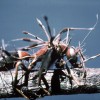
Genetics and Behavior
Feb 8th
Genetics plays a greater role in our lives than many of us realize. While certain behaviors seem obviously connected to a need for survival, many behaviors are linked to genes in ways we do not yet understand. So, to what extent do our genes dictate our behaviors?
One example of controlled behaviors has stirred up a variety of questions. A species of fungus, Ophiocordyceps unilateralis, infects a type of carpenter ant. What is unusual about the infection is that the fungus somehow directs the ant to move to a location on the leaves of the trees normally inhabited by the ants. More >

Staying Positive in the Classroom
Jan 6th
I normally approach each lesson as though I am about to perform on stage. If I am feeling agitated or unhappy I force myself to push aside those feelings and show my excitement about the topic we are about to discuss. I have noticed that lately I have been stuck in a state of boredom when it comes to teaching. I have tried various tricks to get myself out of the rut. Thinking about the needs of the students and why I love teaching seems to help me the most.
I have to remind myself that the students I work with have a lot More >
